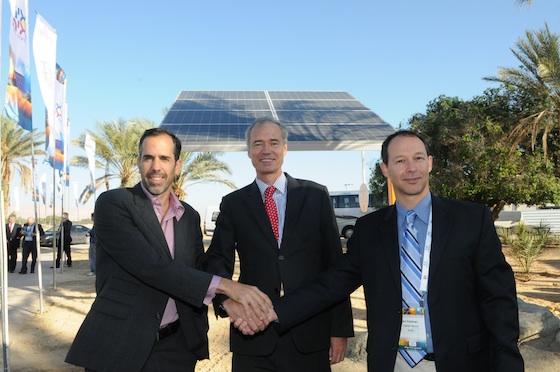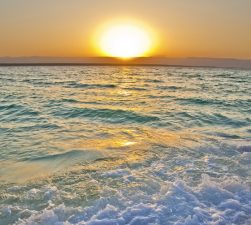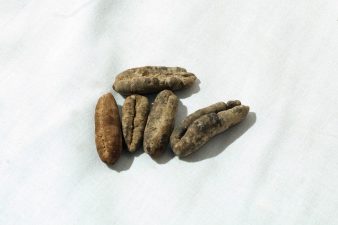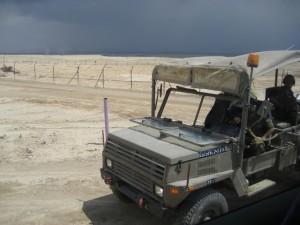 Following the inauguration of Suntech’s new research centre in Arava, we speak to their Chief Technology Officer (pictured centre) about the future of renewables in the Middle East
Following the inauguration of Suntech’s new research centre in Arava, we speak to their Chief Technology Officer (pictured centre) about the future of renewables in the Middle East
As one of the largest producers of solar panels, Suntech is undoubtedly a world player. In Israel alone, out of a total of 220 solar megawatts produced, 100 megawatts are harvested by Suntech’s panels. Suntech panels were also used on the Ketura Sun field, the first commercial solar field in Israel. As such, the company’s decision to open a new research centre in the Arava region didn’t come as a huge surprise. Green Prophet caught up with Suntech’s Chief Technology Officer, Dr. Stuart Wenham to talk about their solar plans for the Middle East region.
According to the Clean Energy Business Council, there are more than 150 renewable-energy projects under way right now in the Middle East and North Africa. For a region which is known mostly for its oil and fossil fuels that is very impressive. Indeed, the region is gained something of a reputation for its increasing interest in renewables and particularly solar. Suntech, which recently opened its research centre in Arava, is in Israel with the hopes of doubling its power production from 100 to 200 megawatts. I spoke to Dr. Stuart Wenham about opportunities in Jordan and Saudi Arabia and the major restrictions they face in Israel.
GreenProphet: China has become world famous for its solar technologies and research. Why did you want to establish a research centre in Arava, Israel?
Dr. Stuart Wenham: Suntech is committed to technological innovation. Our investment in a testing facility is twofold; first to test our most cutting edge technology in some of the harshest conditions on earth, in the Arava desert. Secondly, to invest in a facility where we can work with other local companies to develop and test new technologies that can work to improve the efficiency of our cells and increase the output of our panels.
What restrictions are you facing in Israel and what can the government do to help encourage renewable technologies?
Israel is a land full of sun and harnessing the power of Israel’s most abundant natural resource is something that should be important for all players. Regulatory barriers, layers of bureaucracy and sudden changes in renewable energy policy all present substantial challenges to the sustainability of the market.
Do you hope to further expand your reach in the Middle East/North Africa region? Do you see it as an exciting market?
Yes, this is certainly a promising market. Saudi Arabia plans on installing several gigawatts of installations and we have recently completed the largest solar field in the country, 3.5MW at the King Abdullah Petroleum Studies and Research Center in Riyadh. Jordan is also a promising market as it has recently announced strong policies to support solar. It also lacks substantial fossil fuel reserves, unlike many of its neighbors and therefore needs to more heavily depend on resources like solar.
What countries in the MENA region do you see as having particularly good potential to develop their solar energy?
The Kingdom of Saudi Arabia, Jordan and the United Arab Emirates all have very good prospects for the development of solar.
Why should the region be considering solar and not other alternatives such as wind and nuclear?
The most abundant natural resources that the Middle East has by far is not oil, its sun. The amount of sunlight that shines on the Earth’s surface in one hour is enough to power the world for a whole year. It’s important to tap this unlimited power.
Are bureaucratic restrictions increasing or decreasing in the region?
Bureaucracy is certainly a challenge in many countries, especially for a new industry where many regulations and permitting procedures have yet to be developed. We encourage the development of wise, sustainable and transparent policies that can encourage the development of solar and sustain the industry as well.
Why should countries choose Suntech and not local solar companies and organizations? What are Suntech’s unique selling points?
Suntech’s technology is best suited for harsh desert climates. Suntech’s panels recently passed the desert sand test, which replicates the conditions of a desert sandstorm, the first and only solar power company to do so. Suntech is a global company with a local focus. We have the largest in installed base of panels in the world, over 7MW and have brought power to over 1 million people across the world yet we work with our local partners through our regional offices to bring customer service directly to our customers doors.
: Photo is courtesy of Suntech.
For more on solar in the Middle East see:
Saudi’s $109 Billion Solar Plan
Solar Mama – A Film About Jordan’s Solar Women
Gulf Nations Among Most Attractive Renewable Energy Markets
Bureaucracy Slows Israel’s Solar Energy Progress



